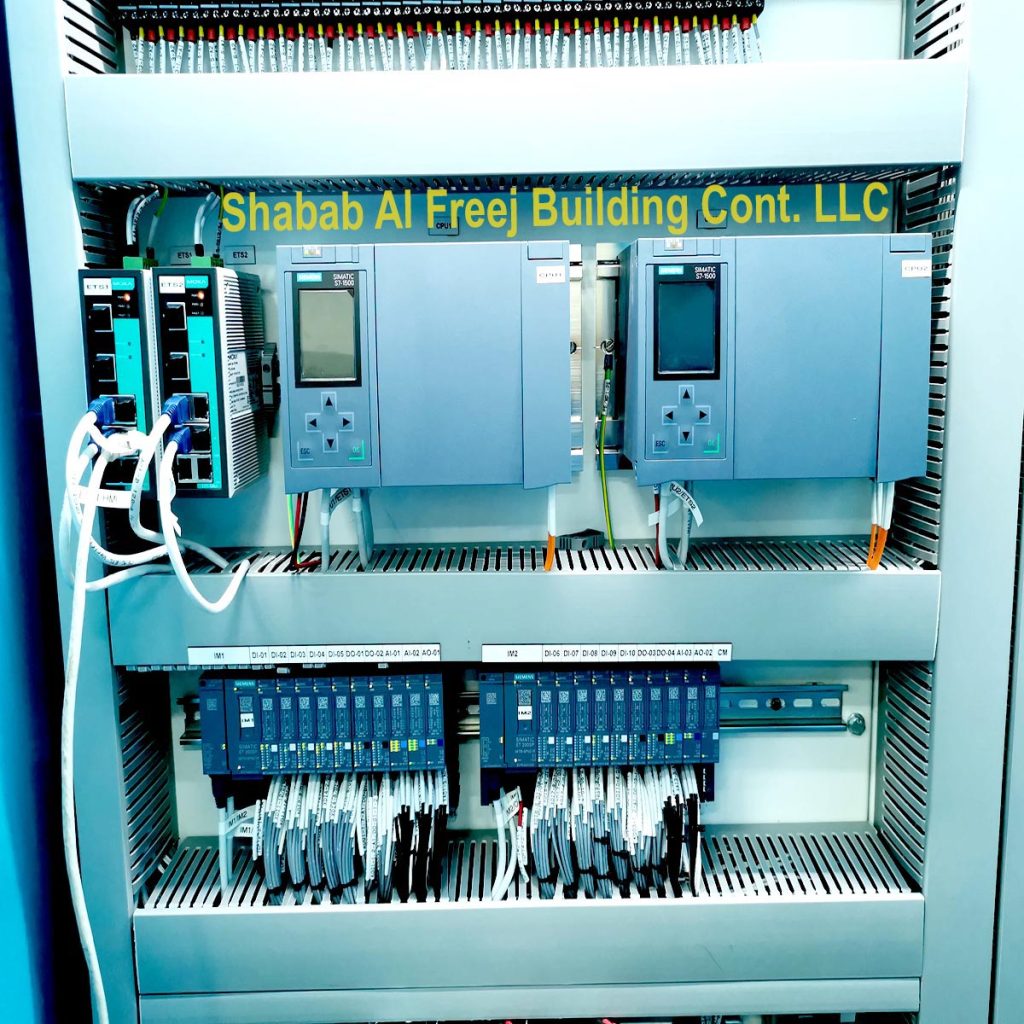
What Is an Electrical Panel
The purpose of an electrical panel, also known as a circuit breaker panel or a fuse box, is to distribute electrical power from the utility company or generator to different areas and appliances in a building. The electrical panel acts as the main distribution point for the building’s electrical system and is responsible for controlling the flow of electricity to different circuits.
The electrical panel contains circuit breakers or fuses that protect electrical circuits from overloading and short circuits. The circuit breakers or fuses are designed to trip or blow when the electrical current exceeds their rated capacity, preventing damage to the wiring and appliances and reducing the risk of electrical fires.
In addition, the electrical panel allows for easy access to shut off power to specific circuits or the entire building in the event of an emergency or for maintenance purposes. This helps ensure the safety of the occupants and the electricians working on the electrical system.
Overall, the electrical panel plays a critical role in the safe and reliable operation of a building’s electrical system. It is important to have a qualified and experienced electrician install and maintain the electrical panel to ensure that it functions properly and safely.
Different Types of Electrical Panel
There are several types of electrical panels, each designed for a specific purpose. The most common types are:
Main electrical panel: This is the primary electrical panel in a building and is responsible for distributing electricity throughout the entire structure. It receives power from the utility company and distributes it to the various circuits in the building. Main electrical panels typically contain a main breaker, which is the largest circuit breaker in the panel and is used to disconnect power from the entire panel.
Sub-panel: This is a smaller electrical panel that is connected to the main electrical panel. It is used to distribute power to a specific area or appliance, such as a garage or a new addition to a building. Sub-panels are commonly used when the main panel does not have enough available circuits to meet the electrical needs of the additional area or appliance.
Transfer switch: This panel is used to switch between the power sources, such as the main power supply and a backup generator. Transfer switches are typically installed in buildings where a power outage would be particularly disruptive, such as hospitals, data centers, or emergency response centers.
Load center: This is a smaller electrical panel that is used in residential buildings. It is designed to handle less power than the main electrical panel and is used to distribute power to specific areas of the house, such as the kitchen or a home office.
Control panel: This is a specialized electrical panel that is used to control machinery or industrial processes. It may include switches, gauges, and other instruments to monitor and control the machinery.
Each type of electrical panel is designed to meet specific requirements and must be installed and maintained by a licensed electrician to ensure safety and reliability. The installation and maintenance of electrical panels are critical to the safe operation of a building’s electrical system. Regular inspections and maintenance can help identify potential problems before they become serious and prevent costly repairs or replacements. It is important to choose a qualified and experienced electrician to install and maintain electrical panels to ensure that they are installed properly and function correctly.
Common Electrical Panel Sizes
Electrical panels come in different sizes and are rated by the maximum amperage they can handle. The size of an electrical panel depends on the electrical needs of the building it is serving. Here are some common electrical panel sizes:
100-amp panel: This panel is commonly used in residential buildings with moderate electrical needs. It can handle up to 100 amps of electrical power and typically has 20 or 30 circuit spaces.
200-amp panel: This panel is the most common size used in residential buildings with high electrical needs. It can handle up to 200 amps of electrical power and typically has 40 to 60 circuit spaces.
400-amp panel: This panel is used in larger residential buildings or small commercial buildings with high electrical needs. It can handle up to 400 amps of electrical power and typically has 80 to 100 circuit spaces.
600-amp panel: This panel is used in larger commercial or industrial buildings with high electrical needs. It can handle up to 600 amps of electrical power and typically has 120 to 160 circuit spaces.
800-amp panel: This panel is used in very large commercial or industrial buildings with high electrical needs. It can handle up to 800 amps of electrical power and typically has 160 to 200 circuit spaces.
It is important to choose the right size electrical panel for the building’s electrical needs. Installing an electrical panel that is too small for the building can cause circuits to overload and trip the circuit breakers, leading to power outages and electrical damage. Installing an electrical panel that is too large for the building can be expensive and wasteful. A qualified and experienced electrical contractor can help determine the right size electrical panel for the building’s needs and ensure that it is installed properly and safely.
How to Determine Electrical Panel Box Sizes
If you are planning to upgrade or replace your electrical panel, it is important to know the size of your current panel. The size of an electrical panel refers to its amperage capacity and the number of circuits it can accommodate. Here are some steps to help you determine the size of your electrical panel:
Determine the Electrical Load: The first step in choosing the right electrical panel is to determine the electrical load required for your building. This is the amount of power needed to run all your electrical devices and appliances. You can calculate your electrical load by adding up the wattage of all your devices and appliances that will be connected to the electrical system. This will help you choose the right size and capacity of the panel.
Type of Panel: There are various types of electrical panels available, including main breaker panels, sub-panel, and load center panels. Main breaker panels are the most common type of panel and are installed as the main power distribution point for the building. Sub-panels are used to distribute power to specific areas of the building, while load center panels are used for small applications like a shed or garage.
Ampacity: The ampacity of an electrical panel is the maximum amount of current it can handle without tripping the circuit breaker. The ampacity you need will depend on the electrical load and the type of panel you choose. In Dubai and Sharjah, the standard ampacity for residential buildings is 200 amps, while commercial buildings may require higher amperage depending on their electrical load.
Check the panel door: The size of the electrical panel is usually indicated on the door or on a label inside the panel. Look for a label that indicates the panel’s amperage rating and the number of circuits it can handle.
Check the main breaker: If you cannot find a label on the panel door, look for the main breaker switch. The size of the main breaker will give you an idea of the amperage rating of the panel. For example, if the main breaker is rated at 100 amps, then the panel is most likely a 100-amp panel.
Count the circuit breakers: Each circuit breaker in the panel represents a circuit that supplies electricity to different areas and appliances in your home. Count the number of circuit breakers in your panel to determine the number of circuits it can accommodate. This can help you determine if your panel has enough capacity to handle your current electrical needs.
Safety Features: When choosing an electrical panel, safety features are essential. Look for panels with built-in safety features like ground fault circuit interrupters (GFCIs), arc-fault circuit interrupters (AFCIs), and surge protection. These safety features can help prevent electrical accidents, fires, and equipment damage.
Brand and Warranty: It’s important to choose a reputable brand and a panel with a good warranty. This will ensure that your electrical panel will perform well and last for years. Some of the top brands for electrical panels include Square D, Siemens, and Eaton.
Consult with a Contractor: If you are still unsure about the size of your electrical panel, it is best to consult with a Professional Contractor. They can inspect your panel and determine its size and capacity, as well as advise you on any upgrades or replacements that may be necessary to meet your electrical needs.
Conclusion: Choosing the right electrical panel is critical to ensure the safety and reliability of your electrical system. Consider the electrical load, type of panel, ampacity, safety features, brand, and warranty when choosing an electrical panel for your home or business in Dubai and Sharjah. It’s always recommended to hire a licensed electrician to install the electrical panel to ensure it meets local electrical codes and safety standards. With the right electrical panel, you can enjoy a safe and reliable electrical system for years to come.
